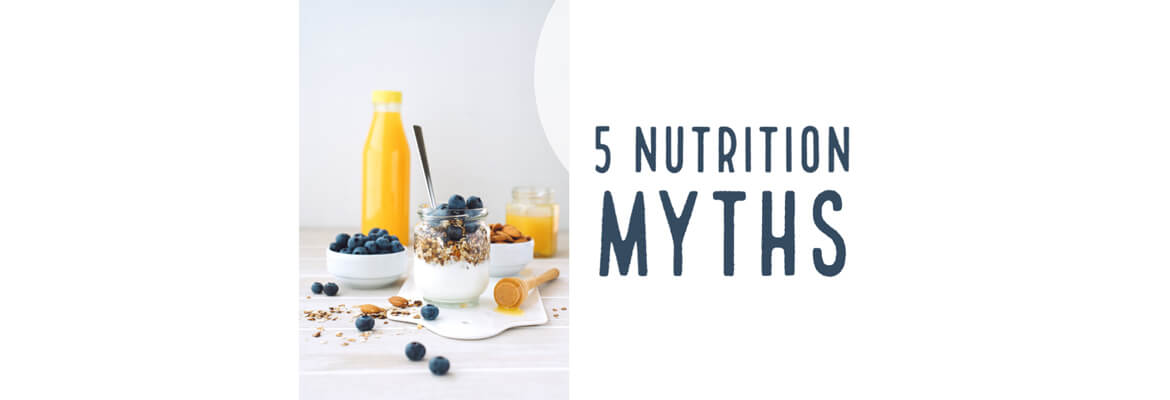11
2021
5 BIGGEST NUTRITION MYTHS IN INDIA

5 biggest nutrition myths in India
There are so many misconceptions in the health market today, especially in India, where oru health market is booming. As a health practitioner, it’s my moral duty to keep you informed of what’s the truth or what is actually a myth. As far as the Indian diaspora is concerned, our needs are very different from the Western World. While the human body and its disease manifestations are the same; the way we eat is also largely dependent on our cultural heritage, genes and climate. Plus, the myths surrounding certain foods may differ from country to country, based on the amount of information that’s available, or even the education levels as far as the health market and products are concerned. I will try to write this blog keeping all these factors in mind.
If its gluten-free its healthy –
Just because a package screams gluten-free it does not necessarily mean it’s healthy. A lot of gluten-free products use starches like tapioca, or even potato starch; this may not suit someone with digestive issues. Going of gluten is goodfor those with celiac disease, those who are intolerant of gluten products (gluten-insensitivity), gluten ataxia, type 1 diabetes or even those with autoimmune disease. Beyond this (especially in India) there is little evidence to support that going off gluten for good is beneficial for everyone. If we want to eat gluten-free, in India we have various options like sorghum (jovar), millets of different kinds like foxtail millet (kangini/cheena), buckwheat (kuttu), barnyard (sanva), that are gluten free. Since Indians, usually eat chapatis made of milled flour, these make for lovely gluten-free options.
Everybody needs supplements –
Just remember everything you put into your body, loads up the liver. So, while vitamins and supplements work really well in a body that has a healthy gut function and is absorbing nutrients, my personal viewpoint is that your diet must give you everything you need and then you can layer supplements and vitamins to fill in the gaps (if needed). In today’s scenario where lifestyle diseases are on the rise, strengthening your diet is of paramount importance. However, any supplementation should be under a supervised health care practitioner.
You must drink a lot of water in the day –
Pushing your body with too much water is actually not great. From a Macrobiotic perspective, you should get most of your water out of the food you eat. If you overdo the water, the kidneys have to work extra hard in flushing out that water, causing some amount of adrenal fatigue and hyponatremia (minerals get diluted). Your level of activity in the day, the climate and how hot you get (could be a high pitta [heat] person) determine how much water you will need. Coffees and teas, do not count as they end up dehydrating you. Sipping sports drinks during workout maybe great, but be mindful of the sugar content, sometimes it’s just nice to stick to coconut water or a lime water (no sugar). A good indicator of if you are getting enough water is if your urine is a light yellow as opposed to being dark.
You must have a protein powder daily if you are a vegetarian or a vegan –
While individual vegetarian sources of protein like beans or lentils, may not be complete protein, being a vegan, I (even though I exercise a lot) have never been deficient in any way. The trick is to balance your meal with a good whole grain, vegetables, and beans/lentils to get complete protein. Also, know your vegetarian sources like amaranth and quinoa which are pseudo-grains and are slightly higher on the amino acid profile. You do not really need a protein powder daily, as long as your meals are balance, yes do feel free to add a plant-based protein powder if you need that extra boost once in a while and build muscle mass.
Coffee/caffeine before a workout helps burn more calories –
There are many benefits to drinking a cup of coffee before a workout: increases concentration, helps you stay energized and recovery post workout is faster; but because it increases your resting heart rate it will make you burn more calories at rest. However, coffee in isolation will not help you reduce weight, you will also need a good diet in-place; plus, there is very little that points one in the direction that drinking coffee before a workout makes you lose weight. Caffeine will shift muscles to burn fat more quickly, which will help keep glycogen stores and aid the muscles from tiring out faster. Caffeine starts affecting muscles in approximately 2 hours. Please note that the macrobiotic approach also warns you against the downside of caffeine consumption which could be spiking of blood sugar levels, headaches, fatigue (post consumption) and increased levels of acidity in a compromised digestive system.
